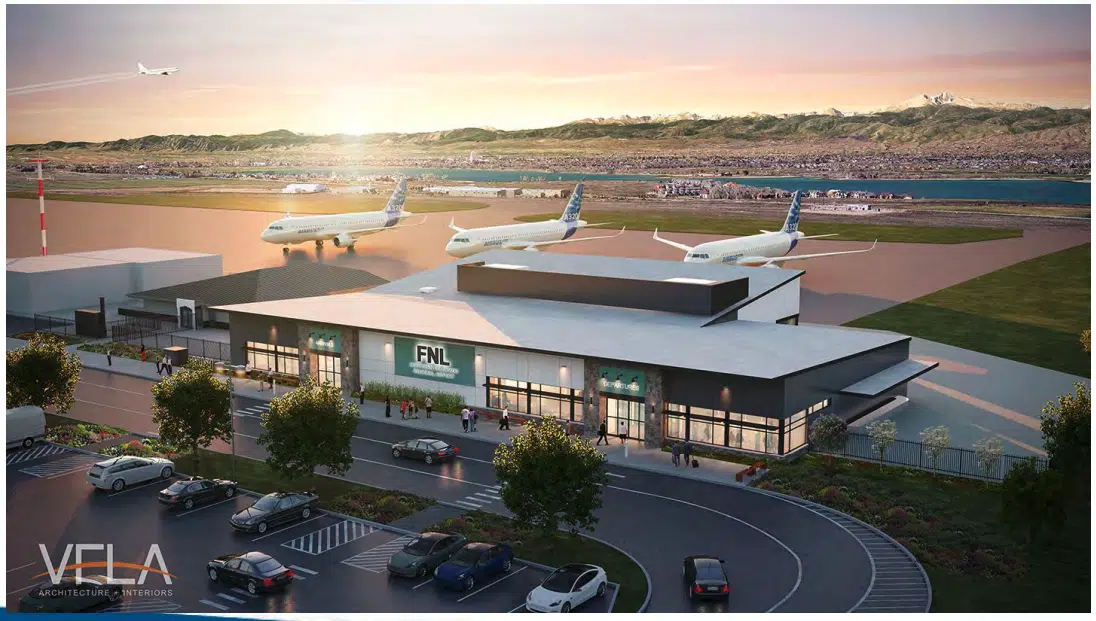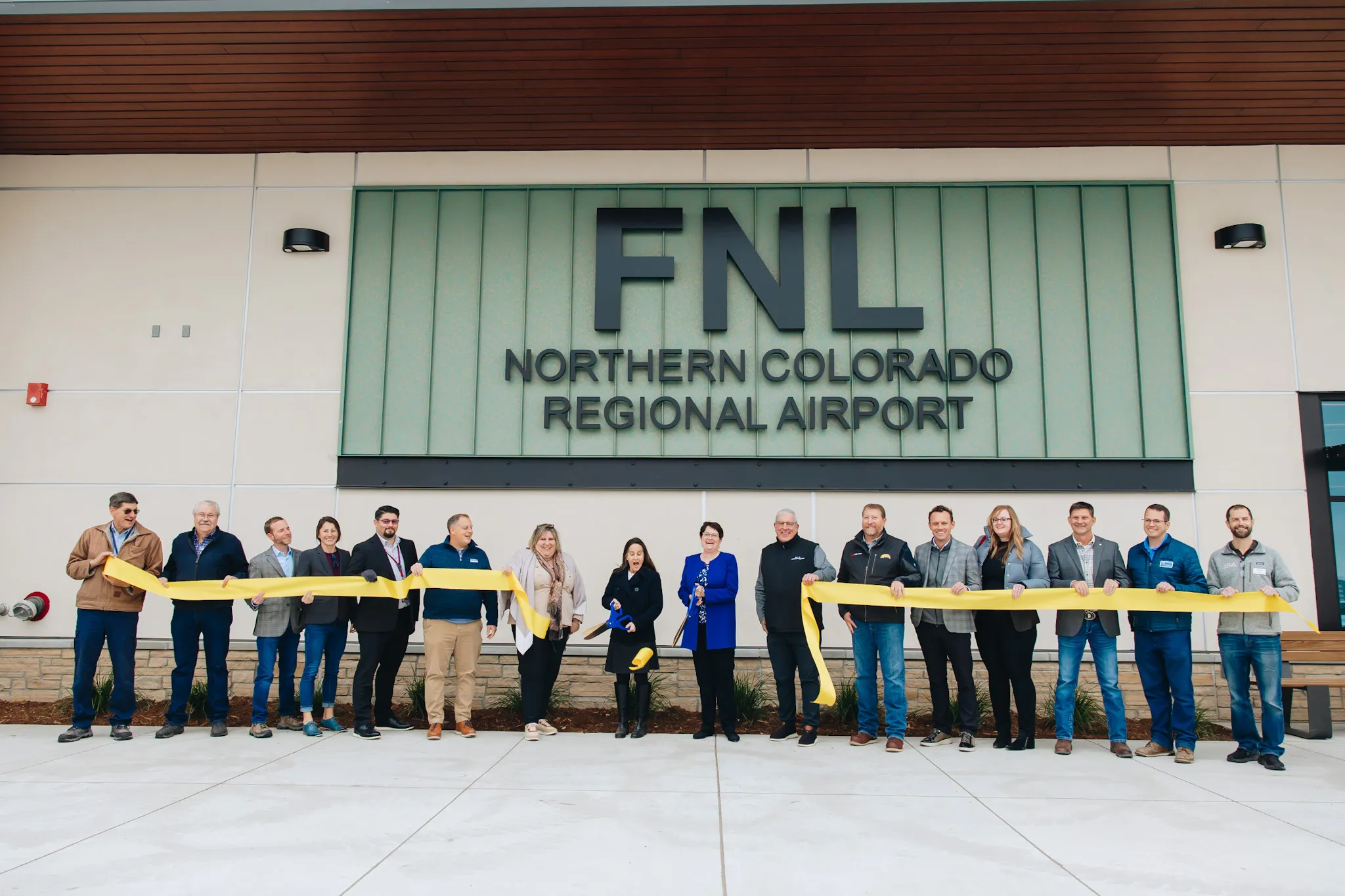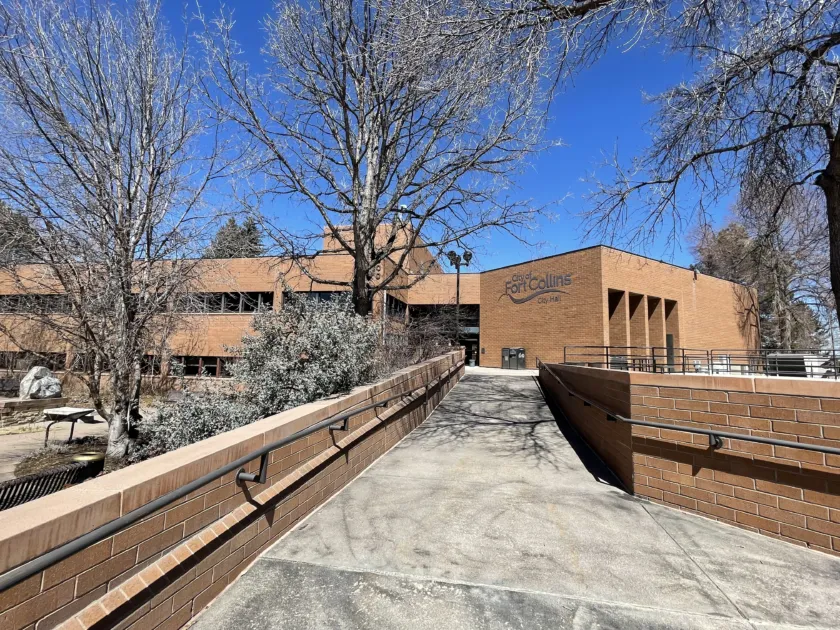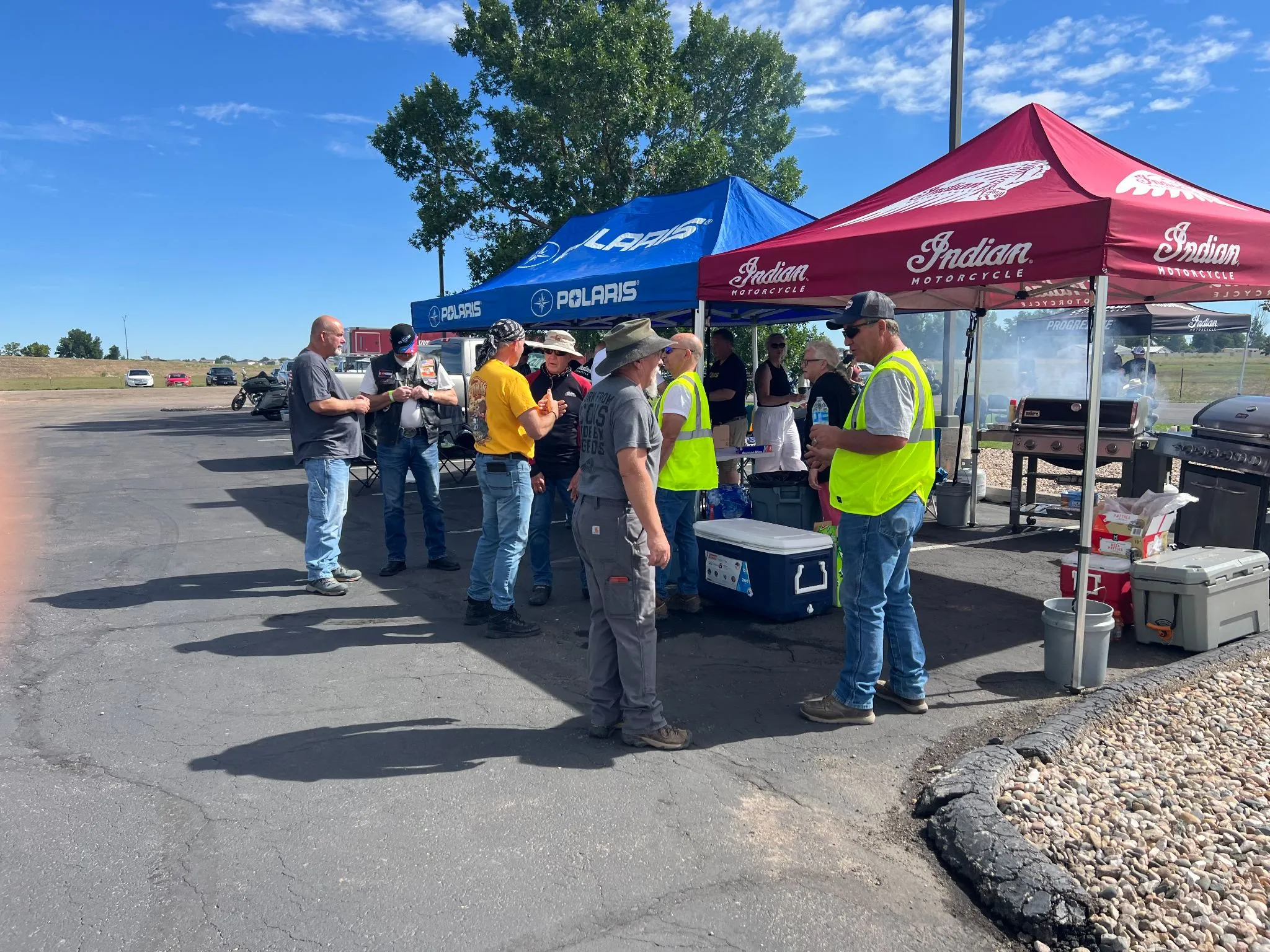Meet the new boss
Ruppel takes reins at a Northern Colorado airport as controversial decisions loom

LOVELAND — Skies over Northern Colorado Regional Airport may be calm and bright on Tuesday when David Ruppel takes over its cockpit as interim director. That doesn’t mean he won’t be facing turbulence as he lands.
The city of Loveland announced late Friday that Ruppel, 62, a consultant with Centennial-based Aviation Management Consulting Group, had been named to temporarily serve as head of the airport while a search is conducted for a permanent director to replace Jason Licon, who resigned effective Friday after 12½ years in the lead role. The airport’s $126,000 contract with AMCG covers six months of Ruppel’s services.
Current airport operations manager Francis Robbins is serving as acting director from Saturday through Monday. Then it’s Ruppel’s turn — with a full-to-brimming in-box.
SPONSORED CONTENT
The airport, jointly owned by the cities of Fort Collins and Loveland in a governance model that even its commission chairman describes as “awkward,” has been embroiled in controversies this year, including over:
- The viability of an experimental remote traffic control facility still awaiting final approval from the Federal Aviation Administration.
- Transparency, after commissioners emerged from a March 2 executive session and issued eviction notices for nearly four dozen owners of private aircraft because of as yet fully undisclosed issues over liability and safety in the hangars where they store their planes.
- Construction of a new 19,400-square-foot, two-gate, $22 million terminal even though no passenger airlines currently serve the airport, The construction contract for that terminal is expected to be approved Tuesday night by the Loveland City Council.

“There’s a lot going on there, which is a good thing. I’ll be stepping in to shepherd it along,” Ruppel said in an interview with BizWest on Saturday. “Every airport has its challenges like that, and major changes make it more challenging. I certainly will have a lot to learn. Those are sensitive issues, especially for the folks who have been in those existing hangars. The key is always communication on both sides and trying to understand what people’s concerns are.”
A former president of the Colorado Airport Operators Association, Ruppel — it’s pronounced ROO-pull — is a 23-year Navy helicopter pilot who managed Yampa Valley Regional Airport in Hayden for nine years and the Colorado Air and Space Port near Watkins for seven.
The temporary role at Northern Colorado Regional won’t be his first such job. As part of AMCG, Ruppel recently provided his services as interim airport manager for the airport in Paso Robles, California.
“Part of what AMCG does is provide this kind of interim services for airports that find themselves in a bind,” Ruppel said. “AMCG asked if this would be something I’d be interested in doing.” He then was interviewed by Steve Adams and Kelly DiMartino, city managers of Fort Collins and Loveland respectively, who also serve on the airport commission.
“They’re a great group of folks doing what they can in a challenging situation,” Ruppel said.
According to the news release issued by the city of Loveland late Friday, Ruppel “has developed expertise in facilities management, safety-management systems, operations-risk management, project management and implementation, compliance, strategic planning, budgeting and operational efficiencies.”
“The airport has demonstrated excellence through safety, innovation and operational efficiency over the past decade,” Adams said in the news release. “David is an experienced aviation leader who can immediately step in to keep this momentum going while we work together with the commission to review the airport’s governance model and develop an inclusive process to find a permanent director.”
DiMartino told BizWest she is “really looking forward to having him serve. He brings great background and expertise as well as some existing knowledge of our airport. We have a lot of things in play at the airport right now, so for both Steve and I it was important to have someone that could get up to speed quickly.”
In the news release, she said Ruppel’s “expertise will help ensure strong operational management and continuity as we continue to evaluate and resolve the important airport governance questions ahead of recruiting an ongoing director.”
That governance study, born out of frustration with some issues surrounding the airport among members of the Fort Collins and Loveland city councils, is being conducted by attorney Dan Reimer’s DSR LLC.
When that study will be completed is as yet unknown — commission chairman Don Overcash told BizWest on Saturday that “we put a rush on it, but who knows?” — but Ruppel noted that “it’s great that they’re looking at this. Any government operation should periodically evaluate the governance model. Things change. Things grow. They may need a different form of governance as they move through different phases of their existence. It’s challenging owning an airport for government at any level, much less two. But there can be real positives for two local governments, and they’ve selected a great company to do this study.”
Reimer supervised the law department at Denver International Airport from 2014 to 2019 after 16 years in private practice representing large and small airports and airport stakeholders across the country. According to his website, “Dan has broad experience in capital projects, commercial development, airline relations, environmental management, concessions, security, and the full range of issues confronting passenger service and general-aviation airports.”
“We refer to him as our FAA attorney,” said Overcash, who stressed that all the airport’s stakeholders will be keenly interested in what Reimer reports.
“We don’t know what we don’t know, and what we do know might not be sufficient,” Overcash said. Referring to the current governance structure that has both city councils voting on airport funding but that leaves purchasing and personnel matters to Loveland alone, he added that “our model is cumbersome, It’s inhibiting the airport reaching its potential. It’s awkward. It can work, but it’s a hindrance to the future of the airport.”
DiMartino noted that “the structure we have has obviously worked for some good period of time, but now there’s a question whether it’s the most-effective model. If we continue, is there a different way to share governance? What are the pros and cons? What options are out there?”
While multiple Northern Colorado Regional Airport stakeholders also have questioned aspects of Licon’s leadership, Ruppel is a supporter.
“This has always been a really well-run airport. Jason did a great job with it,” Ruppel said. “I’ve known Jason for probably close to 15 years. We worked together on the Colorado Airport Operators Association. It’s a good thing to walk into an airport somebody like that has operated.”
Ruppel would say little about the details of Licon’s abrupt departure.
“He had some job opportunities that would take him in a different direction,” Ruppel said. “He wanted to keep those things private, and I understand that as you move on.”
Reached on Saturday in Barcelona, Spain, developer Martin Lind, who has perhaps been Licon’s most vocal critic, said of Ruppel that he’s “super excited that the interim guy has that type of experience.” However, he hopes to be back in Colorado in time to attend Tuesday night’s Loveland City Council meeting, where he plans to plead with its members to hold off on approving a $14.86 million contract with Greeley-based Hensel Phelps Construction Co. to build the terminal.
“I’d love for them to pause the terminal at least a month until the interim director can understand a little more,” Lind said. “I think there are huge problems. It appears there’s no offsite infrastructure in the budget and minimal parking-lot improvements, and that makes for huge additional costs. Something’s wrong here, and we should have a new set of eyeballs take a look. This is too important for Northern Colorado to get it wrong.”
A mostly supportive Loveland City Council and its more skeptical Fort Collins counterpart have each committed $1 million to the construction project. The rest of the total cost is being funded by $16.9 million in federal Coronavirus Aid, Relief and Economic Security (CARES) Act money, $2 million from the airport’s budget and $1.6 million from an FAA grant. The $22 million price tag also includes $3.6 million for administration of the design and construction and $2.2 million in a contingency fund.
According to the contract, the bulk of the CARES Act money needs to be spent by July 2024, and Licon had pushed for speedy approval of the terminal because of that deadline. However, during the public comment period at the commission’s May 18 meeting, attorney Caitlin McHugh of Denver-based law firm Lewis Rocha contended that, according to USASpending.gov, that deadline applies only to 15%, or $2.34 million, of the CARES Act funding, and that the earliest deadline by which any yet-unspent grant funds must be spent would be April 2025.
If Loveland council members approve the contract on Tuesday, Hensel Phelps is expected to begin construction July 10 and complete its work by Sept. 4, 2024. Overcash touted the fact that, in the contract, Hensel Phelps had guaranteed a maximum cost.
“It’s a modest terminal, much less than what some people wanted that was twice as expensive,” Overcash said. “It has expansion capabilities and the ability to eventually bring Customs in.”
Some of the region’s largest companies, such as Nutrien Ag Solutions Inc. and Woodward Inc., fly internationally to and from Northern Colorado Regional Airport but have had to stop on the way back into the United States at other airports that have Customs offices, such as Rocky Mountain Regional Airport in Broomfield or the airports in Billings, Montana, or Casper, Wyoming, because the Loveland-Fort Collins airport has had no such facilities. Executives of Saskatoon, Saskatchewan-based Nutrien take many flights between the airport and Canadian cities such as Saskatoon or Calgary, Alberta, but have to stop off somewhere else on the way back to Northern Colorado to go through Customs.
Lind, whose Water Valley Land Co. developed the Discovery Air Charter Inc. campus at the airport, won approval last October from the U.S. Customs and Border Protection agency for his application to host the Customs office at Discovery Air, located at 5017 Lindbergh Drive in Loveland, after the airport’s governing commission decided a month earlier that funding the new terminal was more important and that the cost to add the Customs office would mean it couldn’t provide additional staff at the airport. Lind then negotiated a deal with Loveland economic-development director Kelly Jones in which Loveland would commit to donate $50,000 each year for the first three years the Customs office was open at Discovery Air. The money would go toward staffing, tenant finish and other expenses. Loveland’s city council approved the incentive pact in December.
Even so, Lind contended then that “this is simply not something private business should be taking the lead on. This Customs office should have been at the airport for years,” he said, adding that it was “super honorable of Kelly to step up.”
Lind said Saturday that his feelings about constructing the terminal “would be different if we had a [passenger airline] tenant come in here and say, ‘Get this done and I’m going to come and satisfy the market.’ Loveland needs to give it some time before they sign a contract they can’t get out of. That’s a huge injustice to stakeholders in the region.”
The airport commission hopes the new terminal will one day serve regularly scheduled airline service again. Avelo Airlines suspended its commercial flights to and from Burbank, California, and Las Vegas last year amid rising fuel prices and supply costs. That pullout came three years after Las Vegas-based Allegiant Travel Co. (Nasdaq: ALGT), which has had a start-and-stop relationship with Northern Colorado Regional Airport for more than a decade, stopped its service to Northern Colorado because the airport didn’t have air traffic towers set up yet.
“That lack of controlled airspace keeps costing them air service,” Lind said, “and that’s from their own study. We shouldn’t be in the business of experimenting with pilot safety.”
The idea of the FAA’s experimental remote air-traffic control facility is that, instead of controllers being positioned in a tower above the airport, controllers would watch a bank of monitors fed by cameras placed around the airport to watch air and ground traffic. The virtual tower has been in planning and testing phases for nearly a decade, but the FAA issued a stop-work order and then extended it another six months to give Nepean, Ontario-based tower contractor Searidge Technologies time to install new technology and cameras to help the facility meet new FAA visibility standards — three miles instead of two. Meanwhile, the FAA is still paying for air-traffic control at the airport.

The stop-work order also was in response to issues surrounding the nation’s only other remote tower, which the FAA shut down in March in Leesburg, Virginia. That facility was developed by private company Saab Inc., while the tower in Loveland was commissioned by the FAA and the Colorado Department of Transportation’s aeronautics division. Their control over its operation led Licon to believe that the remote tower eventually would be a success — but airport commissioners at their May 18 meeting expressed impatience with waiting for the FAA’s decision on whether to approve the tower because it was putting any consideration of alternatives on hold.
“Those timelines are always different when you’re working with a large federal operation,” Ruppel said on Saturday. “I’m looking forward to getting up to speed. I know this is an important project for the FAA, too. You want to make sure you get this right. It would be a tremendous game changer for airports around the region if it works.”
Remembering his days managing the Yampa Valley airport, which serves the winter-sports town of Steamboat Springs, Ruppel said such a facility “would have been a huge help for us as a seasonal airport that’s very busy just four months of the year.”
Overcash added that “I continue to be optimistic that changes the FAA made will help, and the vendor [Searidge} has said, yep, we can make that work. The FAA has put in another $350,000 for six months of funding and has changed some requirements and equipment, so I’m getting encouraged we’re getting close to a decision point.”
Overcash and Licon had been pelted with continued criticism by Lind, general-aviation tenants and other airport stakeholders, some members of both city councils and even fellow airport commissioners Jerry Stooksbury and Jeni Arndt, the Fort Collins mayor, that some of the CARES Act money should have been spent on building a more typical tower instead of all on a terminal. Overcash bristled at the suggestion.
“I get a little frustrated with revisiting things way after the plane has left the gate,” he said. “I’m usually slow to make decisions, but once I make it I proceed with haste. I believe you get everything you need up front and then make the decision. The work on this terminal was done for years up front.”
Overcash described the process of prioritizing airport needs as similar to “a giant jigsaw puzzle. When you find a piece, you put it in even if you didn’t especially want that one at the time. We got a windfall with the CARES Act, so we put that piece in sooner than we anticipated.
“I don’t govern based on ‘could have, would have, should have,” he said. “I remember us on the commission going through this process in detail. Commissioners change every couple years, but I stand by what we knew at the time.”
Overcash also stands by the commission’s decision to evict tenants from four hangar buildings — one each known as “A” and “B” and two designated “C” — after an initial report showed unspecified safety and liability issues in the structures. However, commissioners voted in April to extend the owners’ leases for two additional months in the “C” buildings until Oct. 10 after hearing from Scott Hargrove, a structural engineer at Centennial-based forensic engineering firm Knott Laboratory LLC who toured the two “C” hangar buildings on April 7. Hargrove told them that “our findings are that the general health of the ‘C’ hangars is satisfactory. They need repair, they need some maintenance, but at this point we do not see life-safety issues. With that said, there’s a caveat; if they’re not fixed, not maintained, they will become life-safety issues.”
The commission sent Knott back to take a closer look at the older “A” and “B” hangar buildings that also had been slated for demolition, although those structures’ eviction deadlines of this coming Saturday were left in place and all tenants have now removed their airplanes from those structures.
Pilots have expressed hope that the results of the new report would allow them to at least stay in the “C” buildings for several more years until new hangars could be built. Overcash said Saturday he expects the Knott report to be delivered this coming Friday and included in the packet for the commission’s upcoming regular meeting June 15.
“I suspect what we’re going to hear is not much different than what we already heard,” Overcash said. “I seriously doubt it’ll change anything with ‘A’ and ‘B’ but I hope it will give us some direction on how to mitigate the ‘C’ hangars and, if it’s worth mitigating, how long and what the cost is going to be.
“I’m hoping there will be a clear path forward,” he said, “like, ‘If you did this, you’ll get another year.’ So what will that cost? If they say they’ll last another three to five years, that’s different. And if we did nothing, what would that be? So I’m hoping that within two weeks we’ll have a more clear direction.
“This is a nationwide problem,” Overcash said. “All these general-aviation hangars are old, and when you build new ones the costs are much greater — and that creates tension, because something that was $10,000 before might cost $40,000 now.
“So how do we increase the inventory of hangars? That’s another piece in the puzzle to help us move down that path as well.”
Tenants’ representative and “C” hangar tenant Richard “Rick” Turley has made repeated pleas to the commissioners to tell him what prompted them to make the eviction decision after the executive session so that aircraft owners can make their own more well-informed alternative proposals.
Turley requested 20 minutes to make a presentation to the commission at the June 15 meeting, but Overcash said “I declined because, until we get the engineering report, there isn’t anything for us to be reacting to.”
Turley said Saturday that he also had wanted to see the report prior to his presentation. “Assuming they make it available, we should have all the data we need to make specific recommendations, knowing what the cost estimates are and who is in the best position to meet them.”
Turley had intended to ask for cancellation of the June 10 eviction notices and urge commissioners to fund the maintenance to satisfy the liability concerns.
“I’m led to believe that what we will see is an estimate for the maintenance which is not outlandish but allows the airport to keep those tenants even after paying for the required maintenance,” Turley said, repeating an offer he has made for months. “If the cities won’t pay for it, we as tenants could take on the burden. That’s still on the table, but there’s been very little interest in that proposal.”
Turley noted that at the April meeting, Scott Hargrove with Knott Laboratory and Loveland city engineer Nicole Hahn “were allowed to speak but not allowed to give presentation materials. I’m hoping that at this coming meeting they will be allowed to give a proper presentation — and there’s no reason a specific proposal couldn’t be also part of that meeting.”
Responding to Turley’s request in a June 1 email, Overcash said such an extended presentation by Turley would be “premature” but offered him three minutes during the public-comment period. Turley wrote back that “I am disappointed to learn that I will be denied the opportunity to present alternative proposals to the airport commission for the 3rd month in a row. I respectfully request that you reconsider this decision and reinstate my time on your agenda.” If the Knott report is issued this Friday, he wrote, “this allows airport staff and the Commission a week to review the findings and consider their implications prior to the June 15 meeting. With this report, there will be sufficient data for the commission to consider lifting the A/B/C hangar evictions and determine their interest in providing the requisite funding to substantially reduce liability. There is no need to further delay these decisions.”
Turley wrote that he expects “to provide concrete proposals to the commission regarding options for continued safe occupancy of the ‘C’ hangars with acceptable liability to the cities of Loveland and Fort Collins. While we have discussed these options in past commission meetings, it would be appropriate to readdress these options using the newly released information from the two Knott Laboratories reports. I would appreciate the opportunity to present these options in detail.
“As an alternative, if you have already planned to have airport management prepare a proposal for the June 15 commission meeting, I would ask that I participate in the development of these plans and be part of this presentation. The commission originally promised transparent consideration of these issues with tenant/stakeholder involvement. Allowing me to participate in the development of these proposals would go a long way toward satisfying that commitment.”
Also on Ruppel’s bulky to-do list is figuring out how to deal with Lind, who threatened to file a complaint with the FAA over what he calls unfair treatment by airport officials. In April, Lind delivered a seven-page letter to the commissioners from attorney Michael D. Plachy at Denver-based Lewis Roca Rothgerber Christie LLP in which Plachy contended that the airport is in violation of federal law because, “as a past and prospective recipient of federal funding, it is prohibited from granting preferential treatment or special rights to any airport user, including any fixed-base operator. The airport violates these prohibitions by granting preferential treatment and exclusive rights to jetCenters of Colorado.”
Plachy wrote that “such disparate treatment gives a windfall to jetCenters” at the expense of its competition, including Lind’s Discovery Air.
Decrying “this entire abomination of process with general aviation, manipulated evictions and lack of transparency,” Lind said, new director Ruppel should “put all the decisions over the last six months on hold and let the sunshine of transparency be a disinfectant.”
Ruppel said he’s ready to tackle all the challenges.
“I’ll have an opportunity to make inputs on some significant changes,” he said. “Steve Adams and Kelly DiMartino stressed the importance of projects moving forward, so this is not just something where I’m sitting there holding things where they’re at.
“This is a great airport making a lot of great decisions,” Ruppel said. “The process is moving forward and continuing to grow.”
LOVELAND — Skies over Northern Colorado Regional Airport may be calm and bright on Tuesday when David Ruppel takes over its cockpit as interim director. That doesn’t mean he won’t be facing turbulence as he lands.
The city of Loveland announced late Friday that Ruppel, 62, a consultant with Centennial-based Aviation Management Consulting Group, had been named to temporarily serve as head of the airport while a search is conducted for a permanent director to replace Jason Licon, who resigned effective Friday after 12½ years in the lead role. The airport’s $126,000 contract with AMCG covers six months of Ruppel’s services.
Current…





